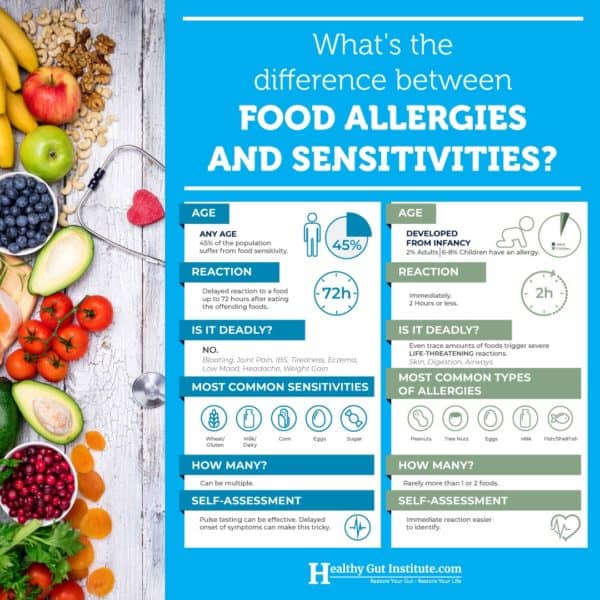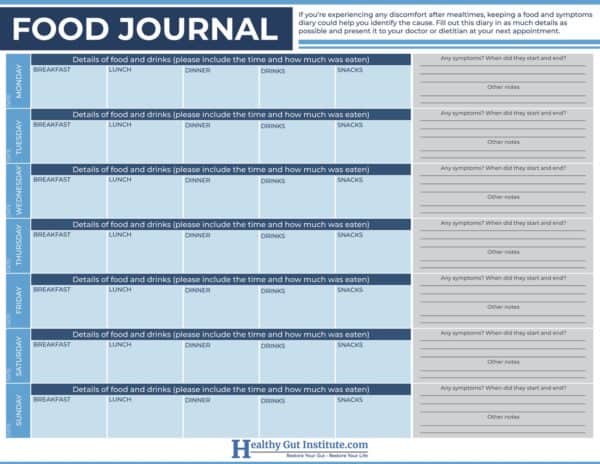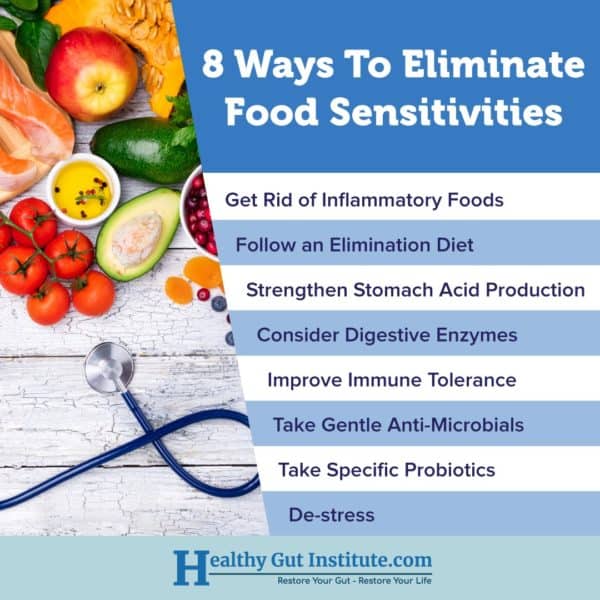Many people brush off digestive issues they experience after they eat. However, this could be a clue from your body that you actually have a food intolerance, which are different things. While an intolerance may not be as dangerous as a food allergy, it’s still important to address, because it can have an impact on your health and overall wellbeing.
What is a Food Intolerance?
Again, an intolerance is not typically life-threatening like an acute allergic reaction, but it can lead to many health issues. It could be the underlying cause to other health concerns you’re dealing with.
Food intolerances are actually on the rise with as many as 20% of the world population having some form of negative reaction. Often, they are difficult to diagnose because symptoms may present in many different ways.
Food Allergy vs. Food Intolerance

While symptoms may appear to be similar between a food allergy and food intolerance, they are quite different. With an intolerance, symptoms may show up within a few hours. Or the symptoms could be delayed as long as 48 hours and may last several hours or days. An individual can be intolerant to several foods and because symptoms are often delayed, it’s difficult to determine the food(s) causing the issue.
With an allergy, however, symptoms are immediate and are caused by a strong reaction from the immune system. That’s why a small amount of food can cause an allergic reaction. On the other hand, with food intolerance, a person may not feel the effects and if they do, think it’s unrelated.
More on Allergies
As mentioned, an allergic reaction is one where the immune system creates an overblown response to a seemingly harmless item, like food. During this reaction, the immune system creates and releases certain disease-fighting antibodies like IgE, IgM, IgA, or IgG, along with other chemicals, including histamine, in order to get rid of the harmful “invader.” Histamine can affect several parts of the body including the respiratory and cardiovascular systems, the skin, and gastrointestinal tract. This leads to serious symptoms like difficulty breathing, facial swelling, low blood pressure, passing out, nausea, severe rashes, chest pain, and cramping. Much like an intolerance, allergies can show up at any age and can be identified with allergy testing.
What About Food Sensitivities, Are They The Same as an Intolerance?
While often lumped together, a food intolerance and sensitivity are quite different. In terms of reaction, a sensitivity actually more closely resembles an allergy in the fact that, like an allergy, it is an immune response. A sensitivity seems to be associated with increased levels of certain antibodies (IgG, IgA, IgM) that are reactive to food, however, unlike a severeallergy(IgE), symptoms are disruptive, but are not life-threatening.
The Symptoms of a Food Sensitivity
Similar to an intolerance, the reaction from a sensitivity to a particular food item may be delayed an hour up to a few days after ingesting, making it difficult to diagnose. In fact, some people will go an entire lifetime not realizing they even have a sensitivity. While signs of a sensitivity include joint pain, stomach paint, brain fog, rashes, and fatigue, other common signs include:
- Eczema or dry and itchy skin
- Acne
- Bloating
- Migraines
- Diarrhea
- Depression and mood swings
- Headaches
- Trouble sleeping
- Reflux
- Dark circles under the eyes
- Runny nose
Because the body, along with the immune system and gut microbiome, are constantly changing, a sensitivity could go away over time. This means that an individual may be able to reintroduce a certain food later on and have their body handle it just fine.
Common Culprits of Food Intolerances

While this isn’t a comprehensive list, here are several foods that commonly cause intolerances:
- Dairy – Specifically lactose, which is a sugar found in dairy products. This affects up to 65% of the population.
- Gluten – A protein found in wheat, barley, rye and triticale which affects up to 13% of the population.
- Caffeine – Found in coffee, soda, tea, energy drinks and even chocolate
Other allergy-related foods can include certain additives, eggs, yeast, nuts, soy, and corn.
Signs of an Intolerance
So what exactly are the signs of being intolerant of certain food items? After eating, you may experience one or more of these symptoms:
- Bloating
- Migraines
- Headaches
- Coughing
- Runny nose
- Feeling under the weather
- Stomach ache
- Irritable bowel
- Hives, skin rashes, and itching
What Causes Food Intolerance?
Now that you know the common foods and signs of an intolerance, it’s helpful to know why one may develop. One of the most popular reasons an individual may be intolerant is due to the absence of an enzyme. Enzymes help you digest food fully, meaning, if one is insufficient or missing, proper digestion cannot occur. As an example, people who cannot digest lactose in milk may be missing the enzyme lactase.
Other causes that make you intolerant can include:
- Chemicals – Certain foods contain chemicals like amines in cheeses or caffeine in coffee that people are unable to properly digest.
- Food poisons or toxins – Some foods contain naturally-occurring chemicals that can have a negative effect on an individual. Undercooked beans have aflatoxin that creates digestive issues.
- Salicylates – This derivative of salicylic acid occurs naturally in plants and can create havoc on an individual consuming large amounts of plant-sourced foods.
Keep a Food Diary to Track Your Reactions

One of the best ways to find out if you have a food intolerance is to start keeping a food diary. Write down everything you eat and make a note of how you feel along with any symptoms that you experience. Next, try an elimination diet and exclude inflammatory foods one at a time to see what effect this has.
Do this for two to six days and then reintroduce these foods to see if symptoms return. Also, work to eliminate stress and consider taking supplements to support healthy digestion including:
- Digestive enzymes – Proteins that speed up chemical reactions allowing for nutrients to be easily absorbed into the digestive tract.
- Probiotics – Live bacteria and yeast that are good for you and your digestive system. a
- Antimicrobials – These agents are able to stop the growth of microorganisms or kill them without doing damage to the host.

Get Lab Tested
Lab testing is one of the ways we help our patients to look further into their reactions. While food tests aren’t perfect, they can provide us with valuable information to address underlying causes of your conditions. There are several different tests out there, which is why it’s best to work with a functional medicine practitioner to help determine the most appropriate test and best course of action for you to take.
Work With Dr. Dempster to Find Your Root Causes
If you think that you are intolerant to a certain food but are not sure where to start, feel free to contact us today. Here at The Dempster Clinic, you can sign up for a complimentary Discovery Session for you. This 15-minute consultation with Dr. Dempster could be the start of getting your health on track and helping you feel better than ever!


